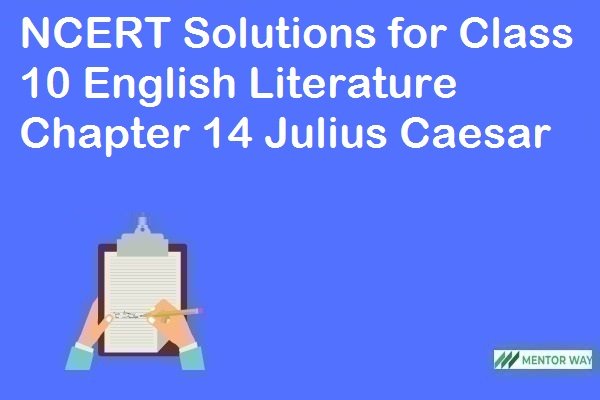NCERT Solutions for Class 10 English Literature Chapter 14 Julius Caesar
19 min read
NCERT Solutions for Class 10 English Literature Chapter 14 Julius Caesar
NCERT Solutions for Class 10 English Literature Chapter 14 Julius Caesar is part of NCERT Solutions for Class 10 English. Here we have given NCERT Solutions for Class 10 English Literature Chapter 14 Julius Caesar.
You can download the NCERT Solutions for Class 10 English Chapter 14 Julius Caesar in PDF Below.
| Board | CBSE |
| Textbook | NCERT |
| Class | Class 10 |
| Subject | English Literature |
| Chapter | Chapter 14 |
| Chapter Name | Julius Caesar |
| Category | NCERT Solutions |
NCERT Solutions for Class 10 English Literature Chapter 14 Julius Caesar
TEXTUAL EXERCISES
(Pages 157 & 185)
Question 1.
Consult a dictionary and find out the difference between
(a) killing
(b) murder
(c) assassination.
Answer:
(а) ‘killing’ means : to cause the death of somebody or something
(b) ‘murder’ means : unlawful killing of a human being intentionally
(c) ‘assassination’ means : killing an important or famous person for money or for political reasons.
Question 2.
Popular and powerful leaders have been assassinated in the past and in recent times. Can you name some of them ?
• ……………………………………………………………………………..
Answer:
” alt=”” aria-hidden=”true” />

Question 3.
Discuss in groups the reasons why the leaders you named in (2) were assassinated. Is assassination the end to a problem ?
Have a group discussion on the topic in the context of past/present day political assassinations.
Introduction :
JULIUS CAESAR is the story of a man’s personal dilemma over moral action, set against
…………………………………………………………………………………
Answer:
Meant for classroom activity. A sample discussion is given below :
A : It is really very sad that great leaders and statesmen have fallen to the bullets of the assassins here and there.
B : They have been most powerful, popular statesmen and politicians of their times. They are Mahatma Gandhi, Indira Gandhi, Rajiv Gandhi, John F. Kennedy, Abraham Lincoln, etc.
C : What amazes me is what for they should be or have been killed !
D : It’s not difficult to know. I personally feel that political rivalry, vested interests, narrow-minded ideology and some political decisions have caused their assassina¬tions.
A : D is right in saying so. Let me elaborate here. Abraham Lincoln was assassinated for abolishing slavery. Rajiv Gandhi was bombed to death because he, as Prime Minister, had sent Indian troops to Sri Lanka ….
B : It is not necessary to debate over the reasons behind these assassinations. But the fact is that there is always good and evil. Without good, evil can’t be isolated and vice-versa. Political interests of the vested few are behind such heinous crimes ….
D : I beg to interrupt here. Let me know what had the great son of India, Mahatma Gandhi done to be assassinated ?
B : It’s not difficult to imagine. Again it is political expediency. Don’t think there was no evil in the golden period when Lord Rama ruled. Even then there were such persons in the form of Ravana. In fact, dualism is the order of nature, good-evil, day-night and life too.
A : As long as people are there, good people and evil people will be there. Such great leaders shall be born and their assassinators shall also be there. What are at the centre of assassinations are, I think, narrow-mindedness, parochial thinking, materialism, terrorism and sycophancy and orthodox ideology.
C : I agree with this.
Question 4.
The play Julius Caesar can be performed on the stage. The first step would be a reading of the play as a whole class. Your teacher will then have an audition and assign you roles. Later the play can be put up on the stage.
Given below are some suggestions and sites which may be visited for instructions regarding set-design, costumes and direction.
Answer:
Classroom activity.
Question 5.
Answer the following questions by ticking the correct options.
1. When Caesar says “Nor heaven nor earth have been at peace to-night” he sounds …………
(a) worried
(b) angry
(c) joyous
(d) frightened.
2. Caesar’s reference to the senators as ‘graybeards’ shows his …………
(a) confidence
(b) cowardice
(c) arrogance
(d) ambition.
3. Decius Brutus changes Caesar’s mind about going to the Senate by appealing to his …………
(a) ambition
(b) vanity
(c) greed
(d) generosity.
4. The offer that Cassius makes to Antony after Caesar’s assassination is that …………
(a) the conspirators would like to be friends with him
(b) he may take Caesar’s body to the pulpit and speak to the crowd praising Caesar for his achievements
(c) his recommendations will be as strong as that of the conspirators while distributing the powers and benefits to friends
(d) he may join the conspiracy against Caesar
5. Cassius tries to stop Brutus from letting Antony speak at Caesar’s funeral as he …………
(а) knows the Roman mob loves Caesar and Antony
(b) knows Brutus is not a good orator
(c) knows they should not have killed Caesar
(d) knows Antony is a good orator who can sway the mob.
6. What prophecy does Antony make over Caesar’s dead body ?
(a) Romans will see Caesar’s ghost roaming on the streets
(b) Rome will experience fierce civil war in which many people will die
(c) Rome will be ruled by Ate
(d) Roman women will smile at the death of Caesar.
7. After listening to Brutus’ speech, the Third Citizen says ‘Let him be Caesar’. This clearly shows he …………
(a) has not understood Brutus’ reason for killing Caesar
(b) loved Caesar more than he loves Brutus
(c) loves Brutus more than he loved Caesar
(d) thinks Brutus killed Caesar to assume power.
8. When Antony calls the conspirators ‘honourable men’ his tone is …………
(a) admiring
(b) flattering
(c) angry
(d) mocking
9. Antony’s reference to Caesar’s conquest of the Nervii is to …………
(а) remind the mob of Caesar’s greatness as a warrior
(b) make the mob feel afraid of being attacked by the war-like race
(c) make the crowd weep for Caesar who died at war
(d) stop and collect his emotions as he is feeling very upset.
10. Antony’s remark Mischief, thou art afoot,
Take thou what course thou wilt! shows him to be …………
(a) a ruthless manipulator
(b) an honourable man
(c) a loyal friend
(d) a tactful man
Answer:
- → (a) worried
- → (c) arrogance
- → (a) ambition
- → (c) his recommendations will be as strong as that of the conspirators while distributing the powers and benefits to friends.
- → (d) knows Antony is a good orator who can sway the mob.
- → (d) Roman women will smile at the death of Caesar
- → (c) loves Brutus more than he loved Caesar
- → (d) mocking
- → (a) remind the mob of Caesar’s greatness as a warrior
- → (d) a tactful man
Question 6.
Answer the following questions briefly :
(a) How do the heavens ‘blaze forth’ the death of Julius Caesar ?
(b) What does Calpurnia try to convince Caesar of ? (V. Imp.)
(c) Why does Calpurnia say ‘Caesar’s wisdom is consumed in confidence’ ? What does she mean ? (CBSE 2016)
(d) What does Calpurnia dream about Caesar ? How does Decius Brutus interpret the dream ? (V. Imp.)
(e) What are the arguments put forward by Decius Brutus to convince Caesar to go to the Capitol ?
(f) Why is Decius more successful than Calpurnia in persuading Caesar ?
(g) What is the petition put before Caesar by the conspirators ? How does Caesar respond to it ?
(h) Who says “Et tu Brute” ? When are these words spoken ? Why ? (V. Imp.)
(i) In the moments following Caesar’s death what do the conspirators proclaim to justify Caesar’s death ?
(j) Seeing the body of Caesar, Antony is overcome by grief What does he say about Caesar ?
(k) Whom does Antony call “the choice and master spirits of this age” ? Why ?
(l) How do Brutus and Cassius respond to Antony’s speech ? (V. Imp.)
(m) Why does Cassius object to allowing Antony to speak at Caesar’s funeral ? How does Brutus overcome this objection ?
(n) What are the conditions imposed by the conspirators before allowing Antony to speak at Caesar’s funeral ?
(o) When he is left alone with the body of Caesar what does Antony call Brutus and the others ?
(p) What prediction does Antony make regarding the future events in Rome ? (V. Imp.)
(q) What reasons does Brutus give for murdering Caesar ? (V. Imp.)
Or
How does Brutus justify Caesar’s assassination ? (CBSE 2015)
(r) Who says, “Let him be Caesar” ? What light does this throw on the speaker ?
(s) Why is Antony’s speech more effective ?
(t) At the end of the scene what is the fate of Brutus and Cassius ?
Answer:
(a) It is generally believed that when kings or princes die, a bright star plucks from the sky. It shoots and falls later. It leaves a blazing light behind it. So when Caesar was murdered, a star blazed forth in the sky.
(b) Calpurnia tries to convince Caesar that what she has seen in her dream means a danger to his life. So he must not go to the senate-house. He, in fact, must not leave home. Caesar doesn’t listen to her fear and is murdered.
(c) Calpurnia means by this that Caesar’s wisdom takes the form of confidence. Due to that he confuses wisdom with confidence. This over-confidence becomes the cause of his murder.
(d) Calpurnia dreamt that Caesar’s statue had a hundred spouts. Pure blood ran from them. Many strong Romans came smiling. They bathed their hands into it. She meant this as an ill-omen. So she feared for Caesar’s life and asked Caesar not to go to the senate-house that day.
But Brutus interpreted the dream differently. He said that the Romans’ bathing their hands meant that Caesar’s blood was his ‘spirit or influence’. It would be treated as a great thing. It shall serve as colours added to a coat of arms. Also it would be treated an object of reverence, mementos and a badge of service.
(e) First Brutus convinces Caesar that his blood will be used as a great thing of reverence by the Romans. They will revere it as souvenirs, coats of arm, etc. Secondly, if Caesar doesn’t go, the senators’ mind may change and they may not offer him the crown.
(f) Decius Brutus is more successful than Calpurnia in persuading Caesar. It is because he is his most trusted friend and a fellow Roman warrior. However, he has joined the conspirators. He has very good oratorical qualities. This is accepted by Caesar when he says that he has well expounded Calpurnia’s dream.
(g) The petition is of Metellus Cimber whose brother has been banished from Rome under law by Caesar. The conspirators want that Caesar should compromise his political right and authority. He should repeal the order of the banishment of Cimber’s brother. This will mean lowering of Caesar’s image as a great Roman. But Caesar doesn’t agree to repeal the order. He is fixed like the northern star and firm in his decisions.
(h) Caesar says these words “Et tu, Brute” (‘Even you, Brutus’) to Brutus who also stabs him with other conspirators. Critics say that Caesar was greatly shocked. He died due to the shock of Brutus’ stabbing. It was because Brutus was very close to his heart. Brutus could not be expected by Caesar to fall so low as to stab him. So Caesar was shocked due to Brutus’s ‘ingratitude’ as is given by many literary critics.
(i) The conspirators proclaim to justify that Caesar had become very ambitious to be a danger to Rome as a country. He had started becoming more and more powerful. In that case he was likely to harm the country for his ambitions. Brutus says that they killed Caesar for the love of Rome. If they had not killed him he would have made all the country a slave and all the countrymen as bondsmen.
(j) He says about Caesar many things of praise. He recollects his conquests, glories, triumphs and spoils. He calls him ‘mighty’ and wonders how ‘low’ he lies in his death. He calls him so great that he has shrunk to a little piece of ground. He calls him a ‘bleeding piece of earth’. He is ‘the ruins of the noblest man’.
(k) Antony calls the conspirators as ‘the choice and master spirits of this age’ with a taunt. He says so deliberately. He flatters them here as the situation demands. He sees that opposing them here would be murderous. So very cleverly he ‘flatters’ them here to outwit them later.
(l) Brutus says that Antony should not think that they are pitiless. He has a pitiful heart. They shall not kill him. But they shall receive him with ‘all kind love, good thoughts, and reverence’. Cassius says that Antony shall have a say in the disposing of new honours. In other words, they have no ill-will against Antony. They shall welcome him as a brave Roman warrior.
(m) Cassius objects to allowing Antony to speak at Caesar’s funeral. He feels that people may be moved against them by his speech. They may turn against them. Cassius’s fears come out true when Antony moves the mob against them. The mob ia now after the blood of the conspirators.
(n) The conditions are : Brutus shall be the first to speak. He shall show the reason of Caesar’s death. Second, whatever Antony speaks, he shall speak with their permission.
(o) When Antony is left alone with the body of Caesar he calls Brutus and others as ‘butchers’. He curses them ‘that shed this costly blood’.
(p) He predicts that a curse shall fall upon men. ‘Domestic fury and civil strife’ shall rage. Blood and destruction shall be common. Mothers shall smile (due to madness) when their infants shall be killed before their own eyes. All pity shall be choked. The Greek goddess of revenge shall rage in the streets with the spirit of Caesar taking revenge. Dead men will cry for burial due to this most foul deed of Caesar’s murder.
(q) Brutus gives various reasons for murdering Caesar. First of all, he says that Caesar was ambitious. He would have made everyone as his bondsman if he had lived. He loved Caesar, no doubt, but he loved Rome more. So Brutus states that they killed Caesar more for the sake of Rome and not for any personal reasons.
(r) The third citizen symbolizing the common Roman people says this line about Brutus. This line speaks much about the speaker, ie, the citizen. He offers a great respect to Brutus. He wants that Brutus should be made the king of Rome as Caesar was to be made.
(s) Antony’s speech is more effective because he appeals to the basic sentiments of the common people, ie, the mob. He very cleverly directs his speech towards Caesar’s greatness as a human being. He, in that way, arouses their basic instinct of revenge I against the conspirators. He does so by stating from his Will that Caesar has left his everything to them. And the conspirators call him ‘ambitious !’ This is really strange, he says.
(t) At the end of the scene, death, destruction, murder, fire etc, are meant for Brutus and Cassius. Antony has roused the mob against the conspirators. The Roman people run mad with fire to search and kill them. They even burn the houses of the conspirators.
Question 7.
Julius Caesar and Antony reveal something about their character in their words and actions. We also learn about them from what other people say. Can you pick out the words that describe them from the box given below ? Also, pick out lines from the play to illustrate your choice.
” alt=”” aria-hidden=”true” />

Answer:
” alt=”” aria-hidden=”true” />

Question 8.
In the play ‘Julius Caesar’, we meet the Roman mob. We find that as Brutus and Antony speak, the mob displays certain qualities and characteristics.
Given below are some characteristics of the mob. Complete the table by quoting the lines wherein these are revealed.
Answer:
” alt=”” aria-hidden=”true” />

” alt=”” aria-hidden=”true” />

Question 9.
Antony employs a number of devices to produce the desired effect on the mob. These devices maybe described as rhetorical devices. He first speaks in such a manner that it seems to the mob that he is in full agreement with Brutus about Caesar. Then step by step he moves away from Brutus’ position, depicting Brutus as a villain and Caesar as a wronged man. Copy and complete the following table by showing how Antony builds the argument in Caesar’s favour.
| Antoy’s words | Argument |
| 1. I come to bury Caesar, not to praise him. | Does not wish to eulogise Caesar |
|
2. The noble Brutus |
Seemingly agrees with Brutus |
Answer:
” alt=”” aria-hidden=”true” />

” alt=”” aria-hidden=”true” />

Question 10.
Read the extracts given below and answer the questions that follow :
1. Caesar : Cowards die many times before their deaths ;
The valiant never taste of death but once.
Of all the wonders that I yet have heard.
It seems to me most strange that men should fear ;
Seeing that death, a necessary end,
Will come when it will come.
(a) Whom is Caesar speaking to ? Why does he say these words ?
(b) What fears has the listener expressed ?
(c) What is the basis for the fears expressed ?
2. But here’s a parchment with the seal of Caesar ;
I found it in his closet, ’tis his Will:
Let but the commons hear this testament—
Which, pardon me, I do not mean to read—
And they would go and kiss dead Caesar’s wounds
(a) Who speaks these words ? Where is the speaker at this moment ?
(b) What are the contents of Caesar’s Will that he is referring to ?
(c) Why does the speaker read Caesar’s Will to the citizens ?
(d) What is the reaction of the listeners to the reading of the Will ?
Answer:
1. (a) Caesar is speaking to his wife Calpurnia. He says these words because Calpurnia has seen a horrible dream indicating Caesar’s death. So she requests him not to go to the senate-house and remain in the house.
(b) The listener Calpurnia has expressed her fear that her dream means danger to the life of Caesar. It indicates that Caesar may be killed or may die. This is the fear expressed.
(c) The basis is that Calpurnia has seen a horrible dream. In it she has seen the statue of Caesar having a hundred spouts. Pure blood ran out of them and Romans dipped their hands in it. These were ominous occurrences suggesting very bad times.
2. (a) Antony speaks these words to the mob. He is at the Capitol at this moment.
(b) The contents of Caesar’s Will are that he has given his everything to the people of Rome. These are his money, gardens and orchards.
(c) The speaker reads Caesar’s Will to prove that Caesar was not ambitious. So he shouldn’t have been murdered. On the other hand, he was a victim to their ill-will and jealousy of the conspirators.
(d) The listeners get agitated and violent. They now are after the bodies of the conspirators who have murdered Caesar in cold blood.
Question 11.
ACTIVITY
Stage a press conference that takes place shortly after Caesar’s death. The “reporters” should have their questions written down ahead of time to ask the students who play the roles of Brutus, Antony, and Cassius. These questions should focus on the key events in the play, as well as the characters’ intentions.
Answer:
This ‘Activity’ is basically to be stage-managed at the class level with the help and guidance of teachers. To facilitate it, we are giving below some ‘questions’ to be asked by the ‘reporters’.
Questions to be asked :
A. To Brutus
- What precisely made you, being very close to Julius Caesar, kill him ?
- You have a very popular image as the noblest of all Romans among the Roman public. What made you stoop down to the level of a murderer ?
- How did you react when Caesar being stabbed called out ‘Et tu, Brute’ ?
- Didn’t you feel bad in Joining the conspirators as they Symbolished ?
B. To Antony
- You were moved undoubtedly by Caesar’s death but why did you join the conspirators ?
- Did you plan beforehand to turn the tables against the conspirators ? If so, how did you do so ?
- Did you know that you’d succeed in your plan to turn the mob against the conspirators ?
- Why did you call Brutus as ‘the noblest of all the Romans’ even though you knew that he was not ?
- You can be charged for inciting the Roman people against the state after Caesar’s death. What do you have to say about it ?
C. To Cassius
- You are said to be the main conspirator. What precisely incited you to bear a grudge against Caesar that led to his assassination ?
- How did you plan your conspiracy to murder Caesar and why ?
- What forced you to make Brutus join the conspiracy even though you knew that he couldn’t be a party to your evil designs against Julius Caesar ?
- You told Brutus not to allow Antony to deliver a funeral speech to the Roman people. But why didn’t you force him not to permit Antony to do so ?
- You as the head of the conspirators have been successful in murdering Julius Caesar. Do you have any remorse or regrets ? What are your future plans now ?
Question 12.
QUESTIONS FOR FURTHER STUDY :
Given below are some questions based on reading of the play ‘Julius Caesar’. These questions are not for testing in the Exam. These are for a deeper understanding of the play and the characters.
(a) Why was the conspiracy to assassinate Julius Caesar hatched ?
(b) Was Caesar really ambitious ? Find evidence from the play to support your answer.
(c) What was Cassius’ motive for murdering Julius Caesar ?
(d) Why was it essential for the conspirators to include Brutus in the conspiracy ?
(e) What were the mistakes made by Brutus that led to the failure of the conspiracy ?
(f) Comment on Caesar’s friendship with Antony.
(g) Write a brief character sketch of Antony.
(h) What is the role of Julius Caesar’s ghost in the play, Julius Caesar ?
(i) Why does Antony call Brutus ‘the noblest Roman of them all’ ?
(j) How do Brutus and Cassius meet their end ?
Answer:
(a) The conspiracy to assassinate Julius Caesar was hatched by Cassius, Casca and others. The main reason behind it was ill-will, jealousy and hatred for Caesar. They didn’t like Caesar to become an emperor and assume more powers to himself. They were, thus, personally against Caesar. Brutus was cleverly made to join them. It was due to legitimize their intent to assassinate Caesar on political and national grounds.
(b) Caesar was not ambitious at all. If he was, why he should have bequeathed his everything in his Will and money for all the Romans. Secondly, when Antony offered him crown, he refused to take it as Antony says before the Roman people.
(c) Cassius’ motive for murdering Julius Caesar was pure ill-will, jealousy and hatred for Caesar as a popular king. He was an ambitious person by himself and wanted to be equal to Caesar.
(d) It was essential for the conspirators to give a stamp of legitimacy to their cause of murdering Caesar. Brutus was a man of noble ideas. Also he was very close to Caesar. His joining them was meant to show that they were right to kill Caesar as Brutus’s name stood for righteousness and fairness.
(e) Brutus allowed Antony to give Caesar a suitable funeral after giving a speech to the people at the Capitol. Second, his utter simplicity and belief in Antony. Third, his leaving him alone with Caesar’s dead body and the mob. Fourth, his not heeding Cassius’ fears in allowing Antony to speak to the people.
(f) Caesar was very close both to Marcus Brutus and Antony. Antony’s sincerity, devotion and closeness to Caesar is seen in what Antony does to Caesar after his death. He calls him ‘bleeding piece of earth’ and praises him for his ‘conquests, glories, triumphs, spoils’ etc. This speaks of his intense and personal loss in Caesar’s death. It is also clear in his turning the tables on the conspirators in a very subtle and flawless manner.
(g) Antony is a noble personality. He has all the human virtues of love, sympathy, sincerity, integrity, solidarity, devotion etc. He has got these good qualities. He doesn’t hesitate to take the maximum use in accordance with them. He is clever and shrewd. He knows how to manoeuvre the situations to his advantage. In this way, he is practical and pragmatic. (In the later part, he is in league with Octavius Caesar. He fights a war with the conspirators and saves the situation.) In that way, he avenges rightly the death of his friend and political mentor, Julius Caesar.
(h) The role of Julius Caesar’s ghost in the play assumes significance in the end. It appears before Brutus and Cassius in the battlefield when the armies of Octavius Caesar and Brutus’ are fighting. Both Brutus and Cassius get very much frustrated. They finally commit suicide.
(i) Antony calls Brutus ‘the noblest of them all’ because he doesn’t suffer from jealousy, grudge, ill-will, hatred, etc, as Cassius and Casca suffer from. He has been made to join the conspirators through crafty means. But he has got a very popular image in the Roman public. It is due to his nobility and justice-loving nature.
(j) Both Brutus and Cassius commit suicide due to the utter disillusionment in the battlefield. They are visited by the ghost of Julius Caesar.
Question 13.
A reporter covers the event of the assassination of Julius Caesar in the senate giving graphic details and a catchy headline. Write the newspaper report in about 200 words.
Answer:
Rome’s Sun Sets in Caesar’s Death
Rome : 20 B.C.—Today around 11 am, Rome’s Sun has set for ever in Caesar’s assassination by his own friends and faithfuls. It has been learnt from reliable sources that Caesar’s wife Calpurnia saw some uncommon and supernatural sort of dreams that night before Caesar was to become the crowned king. She dreamt of seeing blood drizzle upon the Capitol, shrieking of ghosts in the streets, yawning of graves, and : littering of a lioness in the streets. She begged of Caesar not to go to Senate that day as she feared for his life. But he went and was instantly stabbed to death by Brutus, Cassius and Casca. It is said that the most horrible death shock came to him from Marcus Brutus. He relied much on Brutus who was his closest friend. He had a great faith in him also. When he stabbed, Caesar cried, “Et tu, Brute”, that is, “even you, Brutus”. It is evident that Caesar may have been dead more from a psychological shock than the stabbing.
No one from Rome shall arise like Caesar and shine in the political firmament like a meteor. Caesar was an able general and a great conqueror who brought name and fame to Rome. He was to be crowned king after he had defeated the sons of Pompey. Surprisingly, he never craved for the throne. He declined the crown when Antony offered it to him. He was not ‘ambitious’ as he had been branded. If he had been, how come he would have given everything of his to the Roman people as Antony later read out his Will and testament ? Whatever may be the case, Rome has become an orphan in his death. Centuries will go when another Caesar shall be born again in Rome.
We hope the NCERT Solutions for Class 10 English Literature Chapter 14 Julius Caesar help you. If you have any query regarding NCERT Solutions for Class 10 English Literature Chapter 14 Julius Caesar, drop a comment below and we will get back to you at the earliest.



